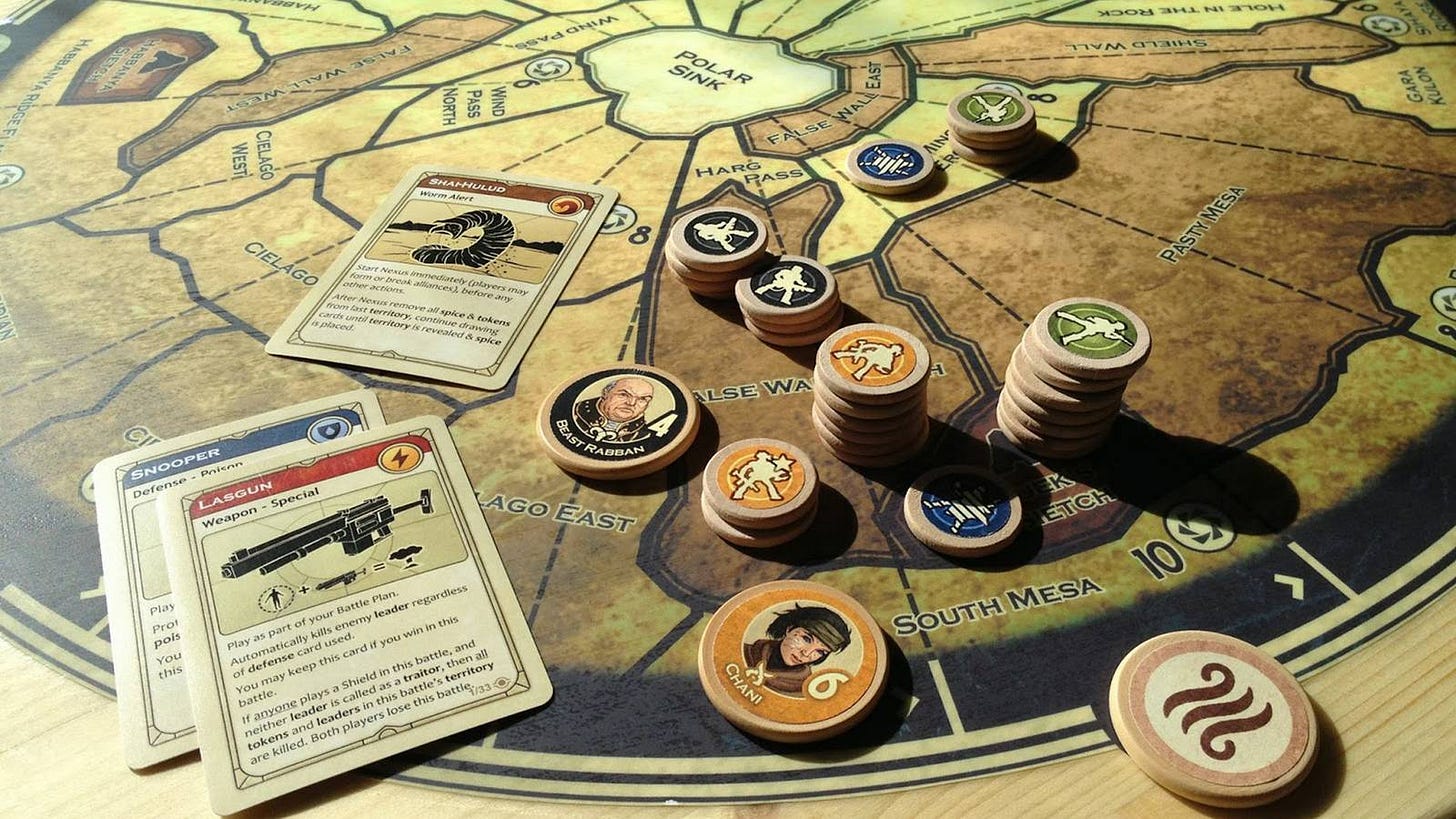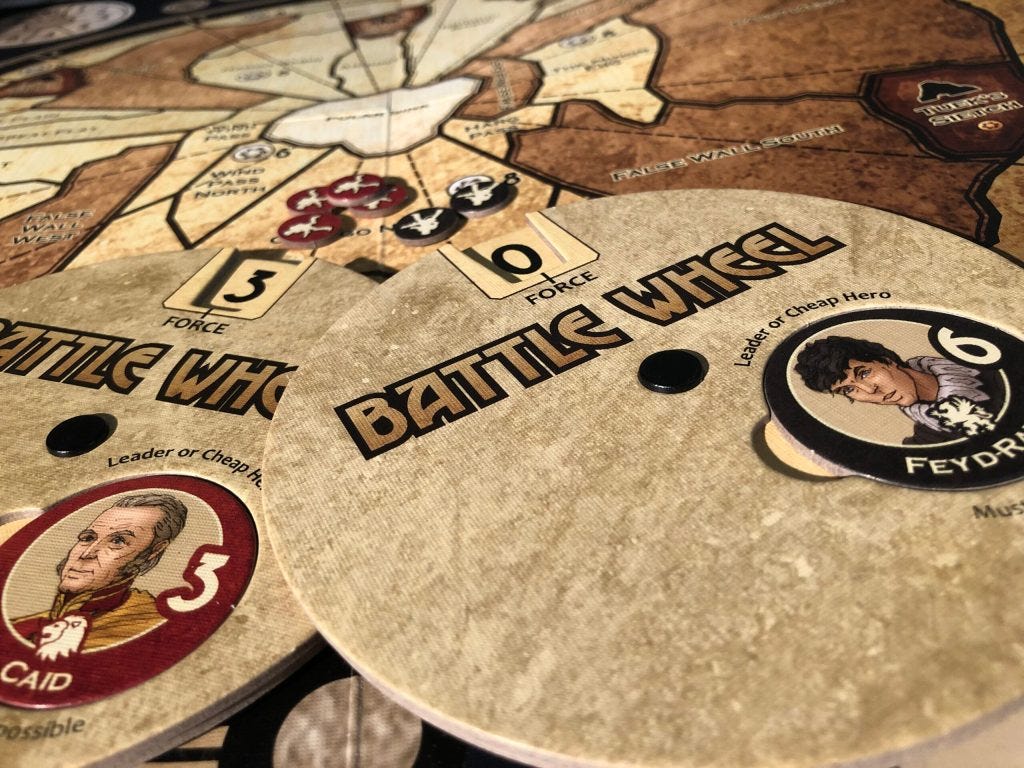A Different Kind of Combat System for TTRPGs
The Battle Wheel from the Dune board game inspired me to design a combat system that's both fast and strategic.
About a year ago, I played the Dune board game for the first time (the Avalon Hill one, not Dune Imperium, though I also played that recently). It was an epic night, and despite the fact we were all learning the rules, it came down to the wire.
This game did a great job of balancing the outcome so that whoever was in the lead seemed to ebb and flow throughout the game until the very end, when it was resolved in a climactic battle. There wasn’t one player who spent the entire game crushing everyone else, and nobody was in a losing position for the entire time. Everyone got their opportunity to snatch victory from the claws of defeat, whether it was by betraying a teammate, making an alliance, getting a lucky draw of cards, or winning an unwinnable battle through some special power or unlikely circumstance.
But what really captured my imagination was the system used to resolve armies clashing on the board - the Battle Wheel.
I’m Colin, and I’m a professional game designer. This is Drolleries, where I write about the games I play and design in the ttrpg space.
In the Dune board game, when two players’ armies clash, you resolve the conflict in a quick, one-round showdown. It’s fast but still strategic — it prioritizes the long-term strategy and context of the battle.
Each player secretly dials a number on the Battle Wheel that corresponds to the number of troops you’re willing to lose if you win, and the maximum you can dial is the number of troops you have in that territory. The winner is whoever dials the highest number. The loser loses all their troops, and the winner only loses however many they dialed.
It’s a simple system at its core. If Atreides has 8 troops and Harkonnen has 6, Atreides knows that they could dial 7 to guarantee victory, but they would only be left with one troop. Where this gets interesting is that each player can also play one of their leader cards, which each have a value that gets added to their total. So instead of dialing 7 to guarantee victory, Atreides could play Duncan Idaho, who has a value of 2, and dial 5 troops instead.
But Harkonnen could do the same, and Atreides knows who their leaders are and how valuable they are. What if Harkonnen plays Beast Rabban (value 4)? That means they could dial a maximum of 6+4 = 10 if they lose all their troops and 5+4 = 9 if they want to keep at least one troop in the territory afterwards. This means that Atreides needs to dial something higher in order to guarantee victory.
Each player can also play weapons and defenses, and if you play a weapon that your opponent doesn’t play the corresponding defense for, then their leader dies, and their value doesn’t contribute to their army’s total.
So Atreides could actually win against Harkonnen here by dialing 7 and playing a poison weapon to kill whatever leader they play.
You can see that it starts simple, but it gets complex quickly. And because you both choose your strategies secretly, then reveal stategies simultaneously, it becomes a mindgame of predicting your opponent. How important is this specific battle to the Harkonnen? How willing are they to lose their best leader?
It means that each battle is interesting because of the larger context of the game surrounding it.
Traditional ttrpgs that feature combat usually either emphasize the actual minutiae of fighting, whether that be through tactics, positioning, resource management, or teamwork. Or the combat is resolved in one roll, and the dramatic question is more of if this encounter can be resolved with combat at all. In games like Mothership or PbtA games, when you want to fight something, you just make one roll and it succeeds or it doesn’t. Combat is abstracted out, which is right for those games, but it doesn’t give the player many interesting choices. The choice is always fight or don’t fight, and the decision is rarely complicated by additional facts of the situation. I think that’s the right choice for those games, but the abstraction leaves something out.
The Dune board game had me thinking: can we have a game where combat is interesting, and the relative strengths and weaknesses of your enemies matters, but resolves just as fast? If not in one roll, maybe in two or maybe three?
I want that feeling of mindgames, of predicting and sizing up your opponent, of judging the risk you’re willing to take to win, and the risk your opponent is willing to take. I want fights to be dramatic in context.
Here’s what I came up with:
Players have 20 energy to spend over the day. Energy replenishes when the player characters rest for 24 hours in a safe place.
PCs also have four stats: attack, defense, speed, and magic. Stats range from 1-6, depending on the PCs’ abilities and weapons.
When a player character fights an enemy controlled by the GM, the player chooses what stat to use, and the amount of energy they will spend on the attack, then adds them together to get their combat power.
At the same time, the GM secretly chooses what stat the enemy will use, then rolls a die to determine how much energy the enemy spends, and totals the result.
After the players have chosen their stats and calculated their combat power, the GM reveals the enemy’s choice of stat and rolls for their energy publicly.
Based on what stat each combatant chose, their combat power is modified:
If you chose attack, your combat power is reduced by your opponent’s defense.
If you chose defense, your combat power is not reduced.
If you chose speed, your combat power is reduced by your opponent’s speed.
If you chose magic, your combat power is reduced by the amount of energy your opponent spent.
If the player’s combat power is greater than the enemy’s, the enemy takes 1 wound. But if the player’s combat power is less than or equal to the enemy’s, the player takes 1 wound.
Wounds decrease your stats until they are healed by a long rest.
Enemies can take 1-3 wounds before being killed, but even tough enemies will often surrender, retreat, or change strategies after taking their first wound.
With multiple combatants on either side, each individual clash is resolved one at a time.
Obviously, this needs more specifics in order to be playable. How do you generate your starting stats? And what stats do enemies have, and what dice do they roll to determine energy? If I ever playtest this system, these are questions I’ll have to answer — they’re the details that you need to hash out with playtesting, and can’t just guess. But the general idea is there, and I think it could be expanded upon.
I think this would fit great with an OSR-type game, a low-magic game about attrition and dwindling resources, where the player characters are sword-and-sorcery-style heroes — vulnerable to death and real wounds, but also capable of taking on legendary monsters if they pool all their energy on one fight. In this genre of fantasy, fights are usually quick and deadly, but still incorporate the strategy of each character’s unique strengths and weaknesses, as well as how the heroes choose to exert themselves.
What I’ve Been Reading
Thalassios wrote a great article about the differing levels of abstraction in ttrpg and how it explains some of the problems with modern d&d systems.
This deep dive into the control scheme of Riot’s new fighting game 2XKO by On Video Games was really interesting for me, both as a 3rd-person combat designer in video games, but also as someone who’s not an avid player of 6-button-layout fighting games.
Murkmail wrote another banger about magic weapons using their rules-light wound system. It’s all killer, no filler, like every other article they write.
Not a blog, but a real book this time! Well, a picture book, an art book. I loved reading Temporary Pleasure: Nightclub Architecture, Design and Culture from the 1960s to Today. It’s a documentation of many historic clubs, including interviews with the architects and owners. It’s about the intersection of art and commerce, as well as how the architecture of certain spaces influences their use.
Thanks for reading!




Dune is one of my favorite board games of all time. It's is one of the very few games I would enjoy playing just as much as a TTRPG.
- May thy knife chip, and shatter
This was very interesting! As an avid board game AND ttrpg player, I'm always intrigued by how one can inspire innovation in the other. Thanks for sharing your observations on Dune and your barebones concept for a combat system.